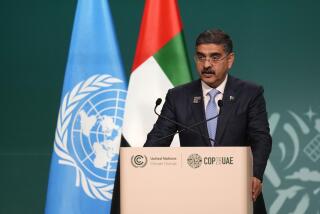Pakistan admits some Taliban ties
- Share via
ISLAMABAD, PAKISTAN — Stung by U.S. allegations that elements in its premier spy agency colluded with Islamic militants in last month’s bombing of the Indian Embassy in Afghanistan, Pakistan acknowledged Friday that there “probably” were Taliban sympathizers within the ranks of its powerful intelligence establishment.
The Pakistani government, which immediately and indignantly denied the reports of its spies’ involvement in the bombing, reiterated that there was no evidence that members of its Directorate for Inter-Services Intelligence had aided Taliban militants in the July 7 attack on the embassy in the Afghan capital, Kabul, which left about 60 people dead.
But by Friday evening, senior Pakistani officials were offering a more nuanced response to U.S. intelligence officials’ allegations of ISI complicity, which were first reported Thursday by the New York Times.
“There is no proof of ISI involvement” in the attack in Kabul, said Pakistani Information Minister Sherry Rehman, who is close to Prime Minister Yusaf Raza Gillani and accompanied him on an official visit to Washington this week.
But she added: “There are probably still individuals within the ISI who are ideologically sympathetic to the Taliban, and act on their own in ways that are not in convergence with the policies and interests of the government of Pakistan. . . . We need to identify these people and weed them out.”
Earlier, military spokesman Maj. Gen. Athar Abbas called the report “unfounded, baseless and malicious.” He said the ISI was a highly disciplined agency that had played a key role in combating militancy.
U.S. officials, however, allege that the ISI has financed, supported and possibly trained members of the Taliban-linked extremist network headed by Afghan tribal warlord Jalaluddin Haqqani, and that his network was responsible for the Indian Embassy blast and other attacks.
The uneasy relationship between Pakistan’s new government and the country’s vastly influential intelligence establishment became an unwelcome focal point of Gillani’s Washington visit, his first since taking office four months ago.
Defense Minister Chaudhry Ahmed Mukhtar, who traveled with Gillani, said President Bush had told the Pakistani leader that American intelligence agencies were reluctant to share sensitive information out of concern that the ISI was passing it on to militants.
Mukhtar also said Bush queried Gillani about who was in charge of the ISI. That followed an embarrassing about-face by Pakistan regarding the agency’s chain of command on the eve of the White House meeting.
With Gillani en route to the U.S., his government announced that the ISI, which is led by a general and whose ranks are full of military men, would begin reporting to the civilian Interior Ministry. That order, which prompted an outcry from the ISI, was rescinded within hours.
Many Pakistani analysts do not believe that Gillani, who presides over a shaky and divided coalition government, can wield any real control over the intelligence establishment, which has long been an entrenched force in Pakistani politics and has flourished under military rulers.
“This government is much too weak for that,” military analyst Ayesha Siddiqi said. “To harness an organization as powerful as the ISI would take very careful planning and coordination, and that has not happened.”
The governing coalition is led by the Pakistan People’s Party, which won the most votes in parliamentary elections held six weeks after the Dec. 27 assassination of its leader, former Prime Minister Benazir Bhutto. But it is locked in conflict with its main coalition partner, the party of former Prime Minister Nawaz Sharif.
The two parties disagree on whether President Pervez Musharraf, who once held near-total power, should be allowed to remain in office after a disputed reelection, and on the reinstatement of judges Musharraf fired last year after imposing emergency rule, akin to martial law.
Critics say the infighting has stalled efforts to formulate a coherent policy on confronting militants who shelter in tribal areas along Pakistan’s border with Afghanistan.
The Bush administration and other Western governments believe that Pakistan’s lack of action in recent months has given militants greater scope to stage attacks on coalition troops across the border in eastern Afghanistan, fueling an increase in troop casualties.
Four Western soldiers were killed Friday in a roadside bombing in Afghanistan’s Kunar province, near the Pakistani border, the NATO-led force said. Their nationalities were not immediately disclosed, but almost all foreign troops in that area are American. A fifth North Atlantic Treaty Organization soldier was killed in a separate attack in another eastern province.
Until the abortive directive regarding the ISI, Gillani had made no visible effort to assert control over Pakistan’s intelligence establishment, which helped create and arm the Taliban movement in the 1990s.
“Today, we are still suffering the blowback from having helped the Afghan Taliban,” said analyst and author Ahmed Rashid, who has written extensively about Islamic militant groups in Pakistan. The new government had been unable to move aggressively to reverse ISI policies, he said.
Rehman and other Gillani aides suggested that the CIA had fed the White House outdated information about the ISI’s ties to militants to put pressure on Pakistan’s government to send more troops into the tribal areas.
“Some of this [information] is many, many months old,” Rehman said.
A former ISI head, retired Lt. Gen. Asad Durrani, said he had no knowledge of involvement by agency operatives in planning the Indian Embassy attack. But he defended the agency’s ties with militant Islamic groups.
“It’s the nature of intelligence work,” Durrani said. “To understand how these organizations operate, you always have to keep links with all kinds of groups, all the time. . . . Ask the CIA.”
--
More to Read
Sign up for Essential California
The most important California stories and recommendations in your inbox every morning.
You may occasionally receive promotional content from the Los Angeles Times.










